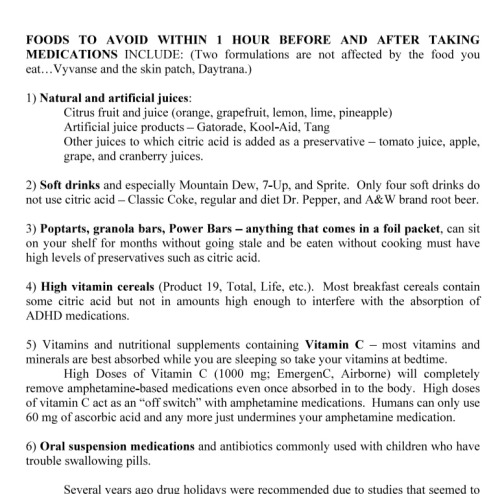https://nw-adhd.com/wp-content/uploads/2017/01/ADHD-Medication-Information-Sheet
i know vitamin c basically neutralizes adhd meds but lemonade good

Transcript
[three users express surprise]
Wait for real
Wait really???
vitamin c does WHAT?

Transcript:
Food restrictions: All of the first line medications for the treatment of ADHD are moderately strong bases (pH of 12-13). If they are present in the small bowel at the same time as a weak organic acid (citric acid or ascorbic acid/Vitamin C) the medication forms an insoluble salt and can not be absorbed into the body. You may have swallowed your medication but, [following is underlined in red]
if you washed it down with orange juice or a soda, none of the medication actually gets into your blood stream.Therefore, avoid the following foods for an hour before and after your dose. Once you feel the benefits of the medication, you may eat or drink anything you wish.

Transcript
[just the bold bits, there's a lot to type otherwise] FOODS TO AVOID WITHIN 1 HOUR BEFORE AND AFTER TAKING MEDICATIONS
1. Natural and artificial juices
2. Soft drinks
3. Poptarts, granola bars, Power Bars -- anything that comes in a foil packet, can sit on your shelf for months without going stale and be eaten without cooking must have high levels of preservatives such as citric acid.
5. Vitamin C
6. Oral suspension medications
yea lol
I have been struggling
For a long fucking time
with why my adderall was having such uneven effects and varying efficacy
and the weird pattern of what made it work and not work and if it was building up in my system or not
and fucking nobody told me I shouldn’t drink a glass of Kool-Aid to take the pills with
or eat fucking Pop-Tarts or Life cereal
this is the most useful information I have ever received from tubr and it seems to be confirmed by several other places upon searching
so this actually should be spread like wildfire like actually
tumblr user firebirdscratches:
Me reading this realizing tunglr dawt kom gave me more information about my medication than MYDOCTORRRRRSSSSSS MYYYYYYYY FUCKENNNNN DOCTORSSSSS PLURAL MULTIPLE DOCTORSSSSSSSS

That is uncannily accurate.
My psychiatrist once remarked that he doesn't have any other patients who he can talk to on the level that he does with me after having a discussion about stuff (we were talking about my response to methylphenidate vs dexamphetamine and I compared the mechanisms of action of each and gave my best guess at what that indicated for my case). He treats me sorta like I'm a junior partner or I'm in residency - I come to him with my observations, symptoms, side effects, hypotheses and I provide the ideas for treatment while he brings the expertise, he deals with the more complicated stuff like interactions between meds, and he's the one to sign off on things or to veto them.
My case is kinda tricky because it's complex and I struggle with the side effects of stimulants so we've had to fumble around and do a lot of tweaking and balancing of side effects by using other meds and shit like that. I wish I could be the one to pop a Vyvanse and I'm golden but unfortunately that's just not how it is for me.
I basically got thrust into being my own psychiatrist and pharmacist and research specialist by circumstance and I drowned in the deep end until I started learning how to swim. I'm just grateful for being lucky enough to have the kind of brain that learns quickly and is good at heuristics and that kinda stuff.
(To be clear though, I don't fancy myself as some sort of expert. A first year psychiatry student would absolutely wipe the floor with me. I just happen to have a lot of problems and a lot of time on my hands lol.)
Happy to hear that it mirrors your experience. It's a weird ass condition for sure.
Doubt that. I've met plenty of them and knowledge about ADHD is not really as prominent as one might think for something that affects possibly 5% of people. All the science dealing with the psyche is still extremely young and underdeveloped. In most cases we have no idea what a drug does to a brain. Just look up Lithium. Stops people from killing themselves better than anything else and nobody knows why. Until recently we thought that people would just "grow out" of ADHD. The naming schemes and definitions change frequently and adoption varies wildly throught the world. It's a mess and they don't always know better.
I would trust a fellow affected person with 327 browser bookmarks about ADHD medication, diagnosis and therapy more than any neurotypical student at pretty much any point. And even some doctors.
Lithium is kinda wild.
There's at least two population studies that have been done which I know of that looked at places that had elevated levels of lithium in their local water supply. Obviously this is nowhere near the dosage of lithium that, say, a bipolar person might be on because lithium has a really narrow therapeutic window (i.e. to get lithium to a level where it's considered effective as established in psychiatry [at least according to the orthodoxy] is just slightly below the doses that become toxic.)
So anyway, two studies on populations who are essentially microdosing lithium. The results? Lower rates of suicide that which are statistically significant.
Makes you wonder if they should be adding a little bit of lithium in with the fluoride, doesn't it? Lol
Lithium is one of those drugs that has some really neat effects and I think it's overlooked for treatment-resistant depression because it's well known as a mood stabilizer and the first-line treatment for bipolar so it gets a bit pidgeonholed because of that fact. Sometimes I wish that prescribing doctors would try going off the beaten path a little bit with the meds they try on their trickier cases instead of just playing SSRI roulette over and over again.